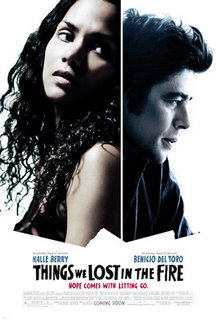
Since winning the Academy Award for
Monster's Ball back in 2002, Halle Berry's career has taken a bizarre route with a string of superhero movies, both decent (
X-Men) and rightfully mocked (
Catwoman), along with some rather odd choices (
Gothika), and some flat-out stinkers (
Perfect Stranger). Her latest film,
Things We Lost in the Fire, is perhaps her first real acting role since she walked away from the Oscar podium that night 5 years ago. It's a fine performance, and it's surrounded by many others to support her. The movie itself works as well, thanks to a screenplay by relative newcomer, Allan Loeb, that favors honesty over melodrama for the most part.
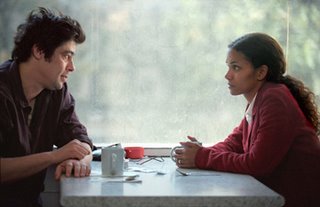
Grieving widow and mother, Audrey Burke (Halle Berry), is still trying to pick up the pieces of her life after her husband, Brian (David Duchovny), was murdered while trying to break up a domestic dispute that he witnessed in the street. She finds a strange sort of comfort in one of Brian's closest friends from childhood, Jerry Sunborne (Belnicio Del Toro). Many people have shunned Jerry in the past, including Audrey, who never understood why her husband remained loyal to him. Jerry is a drug addict struggling to start over, but he keeps on falling into relapses, and can never seem to turn his life around. After Brian's funeral, the two create a strange and perhaps guarded bond, both of them unsure if they should truly trust the other. Audrey eventually invites Jerry to live at her home, half out of concern for his life and health, and half out of the fact that she doesn't want to be alone. Jerry quickly begins to bond with Audrey's two young children, 10-year-old Harper (Alexis Llewellyn) and 6-year-old Dory (Micah Berry). Audrey is not sure how to deal with this, especially when Jerry starts being a part of important moments in her childrens' lives that should have belonged to her husband. Jerry, on the other hand, is faced with his own personal demons of addiction, and trying to make sense out of Audrey's actions and wether they are out of friendship or pity.
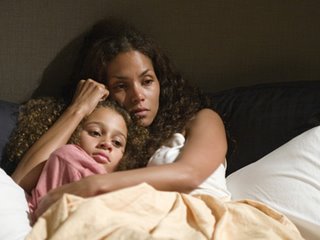 Things We Lost in the Fire
Things We Lost in the Fire has a premise that could have lent itself easily to some heavy-handed melodrama. Denmark director Susanne Bier (making her English language debut with this film) manages to cast a mostly realistic light on the situation, and the characters involved. The movie does not overly simplify the characters or the problems they're facing. In a lesser film, Jerry would clean up his act early on, and then become a model father figure who would slowly fall in love with Audrey. To my surprise, and relief, nothing of the sort ever happens. Jerry struggles with his drug addiction throughout, and the relationship between the two leads remains warm, yet somewhat guarded, as if the two are afraid to truly open up with each other. This is a movie that understands that the situation is not cut and dry, and that healing is a process that cannot be contained within a two hour movie. It doesn't offer any miracles to either of the two characters, and the open ended nature of the conclusion lets us know that they both have a long way to go in their individual lives. I also liked the way that the screenplay portrays Jerry and his addiction in a realistic light. It does not white wash over the fact that he has spent far too long slowly destroying himself, and if it weren't for the fact he had one loyal friend up to the point Brian died, he'd probably have already left this world a long time ago. It manages to make him likable and sympathetic without every shying away from the darkness at the center of the character.

The character of Audrey doesn't get off much easier. She's battling her own personal demons of guilt, anger, and having to deal with her complex feelings of watching her two children slowly bond with Jerry. She is grateful for his presence, but at the same time, we also can clearly see that she resents him. She discovers that he knows things about Brian that even she didn't know, and even though it is a minor thing, it seems monumental to Audrey. The feelings and the complex relationship between the two leads are brought to life in the performances of Halle Berry and Belnicio Del Toro. Their chemistry together is likable, but also intentionally strained and somewhat forced, as if they are both hiding their true feelings for each other. Berry's Audrey both respects and resents this man she has invited into her home, and there are a lot of ways her performance reflects this, such as the way she looks at Jerry when he is helping one of her children overcome their fear of going underwater in a pool. Jerry is accomplishing something her husband never could with their child, and instead of joy, we see a look that seems to say "how dare you". Berry's performance, and the screenplay, wisely does not play up her mixed feelings at witnessing this moment, and lets her face and her eyes say it all. It's the little moments such as this that made me admire the film.
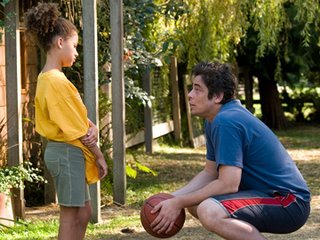
If the movie had consistently been this sure footed, we'd probably be looking at a great film here. But, because the movie does at times slip into some artificial-sounding dialogue and a few moments of out of place melodrama that it will just have to settle for being very good. Nothing wrong with that, of course. There are just a couple moments that ring false, such as when one of the children asks Jerry if he ever feels like his life is like a sad movie. The line itself sounds like nothing a 10-year-old would say, and it doesn't even sound right coming out of the mouth of the child, as it's just too scripted and forced. I also felt a missed opportunity in the character of Kelly (Alison Lohman), a fellow recovering drug addict whom Jerry meets at a group help meeting. She is supposed to play an important role in his road to recovery, but she never seems to come across as being as major of a character as she should, sort of coming and going as the movie sees fit. The movie centralizes itself so much on the internal problems of Audrey and Jerry that sometimes the outside characters seem to be pushed to the side.
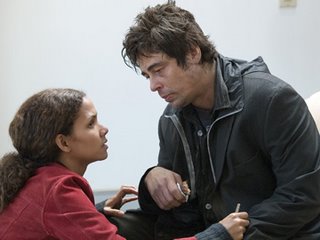
It's really not a huge deal, as I found myself enjoying
Things We Lost in the Fire quite a lot. The movie hits a few false notes, but it also holds a surprising amount of honesty and subtlety with material that could have easily become manipulative or bombastic. If anything, it proves a potential turning point for Berry, who will hopefully get over the superhero kick she's been under for the past four years, and get back to some more serious roles such as this. This is a movie with a heart and a brain worthy of the characters who inhabit the story, and seems to care about them as much as we eventually do. By the time the movie's over, we've been through a lot with the characters, and although their struggles will continue after the end credits have finished, we have hope for them.
0 comments
 Since winning the Academy Award for Monster's Ball back in 2002, Halle Berry's career has taken a bizarre route with a string of superhero movies, both decent (X-Men) and rightfully mocked (Catwoman), along with some rather odd choices (Gothika), and some flat-out stinkers (Perfect Stranger). Her latest film, Things We Lost in the Fire, is perhaps her first real acting role since she walked away from the Oscar podium that night 5 years ago. It's a fine performance, and it's surrounded by many others to support her. The movie itself works as well, thanks to a screenplay by relative newcomer, Allan Loeb, that favors honesty over melodrama for the most part.
Since winning the Academy Award for Monster's Ball back in 2002, Halle Berry's career has taken a bizarre route with a string of superhero movies, both decent (X-Men) and rightfully mocked (Catwoman), along with some rather odd choices (Gothika), and some flat-out stinkers (Perfect Stranger). Her latest film, Things We Lost in the Fire, is perhaps her first real acting role since she walked away from the Oscar podium that night 5 years ago. It's a fine performance, and it's surrounded by many others to support her. The movie itself works as well, thanks to a screenplay by relative newcomer, Allan Loeb, that favors honesty over melodrama for the most part. Grieving widow and mother, Audrey Burke (Halle Berry), is still trying to pick up the pieces of her life after her husband, Brian (David Duchovny), was murdered while trying to break up a domestic dispute that he witnessed in the street. She finds a strange sort of comfort in one of Brian's closest friends from childhood, Jerry Sunborne (Belnicio Del Toro). Many people have shunned Jerry in the past, including Audrey, who never understood why her husband remained loyal to him. Jerry is a drug addict struggling to start over, but he keeps on falling into relapses, and can never seem to turn his life around. After Brian's funeral, the two create a strange and perhaps guarded bond, both of them unsure if they should truly trust the other. Audrey eventually invites Jerry to live at her home, half out of concern for his life and health, and half out of the fact that she doesn't want to be alone. Jerry quickly begins to bond with Audrey's two young children, 10-year-old Harper (Alexis Llewellyn) and 6-year-old Dory (Micah Berry). Audrey is not sure how to deal with this, especially when Jerry starts being a part of important moments in her childrens' lives that should have belonged to her husband. Jerry, on the other hand, is faced with his own personal demons of addiction, and trying to make sense out of Audrey's actions and wether they are out of friendship or pity.
Grieving widow and mother, Audrey Burke (Halle Berry), is still trying to pick up the pieces of her life after her husband, Brian (David Duchovny), was murdered while trying to break up a domestic dispute that he witnessed in the street. She finds a strange sort of comfort in one of Brian's closest friends from childhood, Jerry Sunborne (Belnicio Del Toro). Many people have shunned Jerry in the past, including Audrey, who never understood why her husband remained loyal to him. Jerry is a drug addict struggling to start over, but he keeps on falling into relapses, and can never seem to turn his life around. After Brian's funeral, the two create a strange and perhaps guarded bond, both of them unsure if they should truly trust the other. Audrey eventually invites Jerry to live at her home, half out of concern for his life and health, and half out of the fact that she doesn't want to be alone. Jerry quickly begins to bond with Audrey's two young children, 10-year-old Harper (Alexis Llewellyn) and 6-year-old Dory (Micah Berry). Audrey is not sure how to deal with this, especially when Jerry starts being a part of important moments in her childrens' lives that should have belonged to her husband. Jerry, on the other hand, is faced with his own personal demons of addiction, and trying to make sense out of Audrey's actions and wether they are out of friendship or pity. Things We Lost in the Fire has a premise that could have lent itself easily to some heavy-handed melodrama. Denmark director Susanne Bier (making her English language debut with this film) manages to cast a mostly realistic light on the situation, and the characters involved. The movie does not overly simplify the characters or the problems they're facing. In a lesser film, Jerry would clean up his act early on, and then become a model father figure who would slowly fall in love with Audrey. To my surprise, and relief, nothing of the sort ever happens. Jerry struggles with his drug addiction throughout, and the relationship between the two leads remains warm, yet somewhat guarded, as if the two are afraid to truly open up with each other. This is a movie that understands that the situation is not cut and dry, and that healing is a process that cannot be contained within a two hour movie. It doesn't offer any miracles to either of the two characters, and the open ended nature of the conclusion lets us know that they both have a long way to go in their individual lives. I also liked the way that the screenplay portrays Jerry and his addiction in a realistic light. It does not white wash over the fact that he has spent far too long slowly destroying himself, and if it weren't for the fact he had one loyal friend up to the point Brian died, he'd probably have already left this world a long time ago. It manages to make him likable and sympathetic without every shying away from the darkness at the center of the character.
Things We Lost in the Fire has a premise that could have lent itself easily to some heavy-handed melodrama. Denmark director Susanne Bier (making her English language debut with this film) manages to cast a mostly realistic light on the situation, and the characters involved. The movie does not overly simplify the characters or the problems they're facing. In a lesser film, Jerry would clean up his act early on, and then become a model father figure who would slowly fall in love with Audrey. To my surprise, and relief, nothing of the sort ever happens. Jerry struggles with his drug addiction throughout, and the relationship between the two leads remains warm, yet somewhat guarded, as if the two are afraid to truly open up with each other. This is a movie that understands that the situation is not cut and dry, and that healing is a process that cannot be contained within a two hour movie. It doesn't offer any miracles to either of the two characters, and the open ended nature of the conclusion lets us know that they both have a long way to go in their individual lives. I also liked the way that the screenplay portrays Jerry and his addiction in a realistic light. It does not white wash over the fact that he has spent far too long slowly destroying himself, and if it weren't for the fact he had one loyal friend up to the point Brian died, he'd probably have already left this world a long time ago. It manages to make him likable and sympathetic without every shying away from the darkness at the center of the character. The character of Audrey doesn't get off much easier. She's battling her own personal demons of guilt, anger, and having to deal with her complex feelings of watching her two children slowly bond with Jerry. She is grateful for his presence, but at the same time, we also can clearly see that she resents him. She discovers that he knows things about Brian that even she didn't know, and even though it is a minor thing, it seems monumental to Audrey. The feelings and the complex relationship between the two leads are brought to life in the performances of Halle Berry and Belnicio Del Toro. Their chemistry together is likable, but also intentionally strained and somewhat forced, as if they are both hiding their true feelings for each other. Berry's Audrey both respects and resents this man she has invited into her home, and there are a lot of ways her performance reflects this, such as the way she looks at Jerry when he is helping one of her children overcome their fear of going underwater in a pool. Jerry is accomplishing something her husband never could with their child, and instead of joy, we see a look that seems to say "how dare you". Berry's performance, and the screenplay, wisely does not play up her mixed feelings at witnessing this moment, and lets her face and her eyes say it all. It's the little moments such as this that made me admire the film.
The character of Audrey doesn't get off much easier. She's battling her own personal demons of guilt, anger, and having to deal with her complex feelings of watching her two children slowly bond with Jerry. She is grateful for his presence, but at the same time, we also can clearly see that she resents him. She discovers that he knows things about Brian that even she didn't know, and even though it is a minor thing, it seems monumental to Audrey. The feelings and the complex relationship between the two leads are brought to life in the performances of Halle Berry and Belnicio Del Toro. Their chemistry together is likable, but also intentionally strained and somewhat forced, as if they are both hiding their true feelings for each other. Berry's Audrey both respects and resents this man she has invited into her home, and there are a lot of ways her performance reflects this, such as the way she looks at Jerry when he is helping one of her children overcome their fear of going underwater in a pool. Jerry is accomplishing something her husband never could with their child, and instead of joy, we see a look that seems to say "how dare you". Berry's performance, and the screenplay, wisely does not play up her mixed feelings at witnessing this moment, and lets her face and her eyes say it all. It's the little moments such as this that made me admire the film. If the movie had consistently been this sure footed, we'd probably be looking at a great film here. But, because the movie does at times slip into some artificial-sounding dialogue and a few moments of out of place melodrama that it will just have to settle for being very good. Nothing wrong with that, of course. There are just a couple moments that ring false, such as when one of the children asks Jerry if he ever feels like his life is like a sad movie. The line itself sounds like nothing a 10-year-old would say, and it doesn't even sound right coming out of the mouth of the child, as it's just too scripted and forced. I also felt a missed opportunity in the character of Kelly (Alison Lohman), a fellow recovering drug addict whom Jerry meets at a group help meeting. She is supposed to play an important role in his road to recovery, but she never seems to come across as being as major of a character as she should, sort of coming and going as the movie sees fit. The movie centralizes itself so much on the internal problems of Audrey and Jerry that sometimes the outside characters seem to be pushed to the side.
If the movie had consistently been this sure footed, we'd probably be looking at a great film here. But, because the movie does at times slip into some artificial-sounding dialogue and a few moments of out of place melodrama that it will just have to settle for being very good. Nothing wrong with that, of course. There are just a couple moments that ring false, such as when one of the children asks Jerry if he ever feels like his life is like a sad movie. The line itself sounds like nothing a 10-year-old would say, and it doesn't even sound right coming out of the mouth of the child, as it's just too scripted and forced. I also felt a missed opportunity in the character of Kelly (Alison Lohman), a fellow recovering drug addict whom Jerry meets at a group help meeting. She is supposed to play an important role in his road to recovery, but she never seems to come across as being as major of a character as she should, sort of coming and going as the movie sees fit. The movie centralizes itself so much on the internal problems of Audrey and Jerry that sometimes the outside characters seem to be pushed to the side. It's really not a huge deal, as I found myself enjoying Things We Lost in the Fire quite a lot. The movie hits a few false notes, but it also holds a surprising amount of honesty and subtlety with material that could have easily become manipulative or bombastic. If anything, it proves a potential turning point for Berry, who will hopefully get over the superhero kick she's been under for the past four years, and get back to some more serious roles such as this. This is a movie with a heart and a brain worthy of the characters who inhabit the story, and seems to care about them as much as we eventually do. By the time the movie's over, we've been through a lot with the characters, and although their struggles will continue after the end credits have finished, we have hope for them.
It's really not a huge deal, as I found myself enjoying Things We Lost in the Fire quite a lot. The movie hits a few false notes, but it also holds a surprising amount of honesty and subtlety with material that could have easily become manipulative or bombastic. If anything, it proves a potential turning point for Berry, who will hopefully get over the superhero kick she's been under for the past four years, and get back to some more serious roles such as this. This is a movie with a heart and a brain worthy of the characters who inhabit the story, and seems to care about them as much as we eventually do. By the time the movie's over, we've been through a lot with the characters, and although their struggles will continue after the end credits have finished, we have hope for them.






0 Comments:
Post a Comment
<< Home